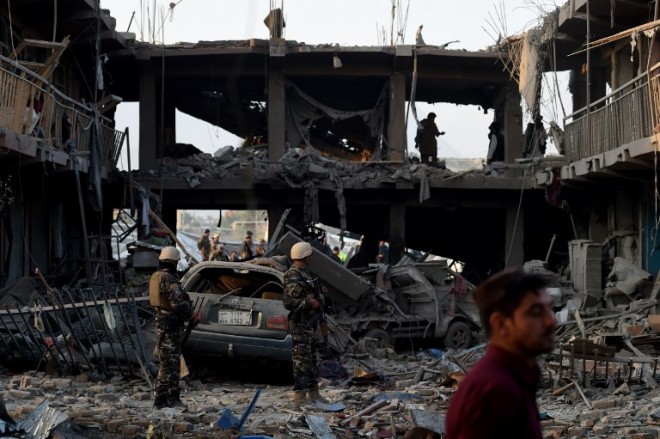Powerful truck bomb kills eight, wounds more than 100 in Afghanistan

Afghan security forces inspect the site after a powerful truck bomb het in Kabul on August 7, 2015. A powerful truck bomb killed eight people and wounded more than 100 others, officials said, the first major attack in the Afghan capital since the announcement of Taliban leader Mullah Omar’s death. AFP PHOTO / Wakil Kohsar
KABUL, Afghanistan — A huge truck bomb in Kabul early Friday killed eight people and wounded more than 100 others in the first major attack in the Afghan capital since the announcement of Taliban leader Mullah Omar’s death.
No group immediately claimed responsibility for the attack, which comes as the Taliban step up their summer offensive despite a bitter power transition within the militant movement.
Women and children were among the casualties of the powerful blast that struck Shah Shaheed, a neighbourhood in east Kabul, but rattled homes across the city, damaging buildings and shattering windows.
The force of the explosion left an enormous crater in the road, around 10 meters (30 feet) deep, and reduced the front of nearby buildings to rubble.
“The death toll has reached eight, and the wounded stands at 128,” Kabul police spokesman Ebadullah Karimi told AFP.
Article continues after this advertisementKabul police chief General Abdul Rahman Rahimi confirmed the number of dead and wounded, saying officials were searching for anyone trapped under the mangled concrete debris.
Article continues after this advertisement“The killed and wounded include women and children, and laborers of a nearby marble stone company are among the victims. The attack was intended to cause mass murder,” he said.
Health ministry spokesman Wahidullah Mayar said the number of wounded could run into the hundreds, with most suffering injuries from flying glass.
It was not clear whether the intended target was an Afghan National Army base close to Shah Shaheed, a largely middle-class civilian residential area with no major foreign presence, but Rahimi said no military casualties were reported.
The wounded were trickling into city hospitals, Mayar said, with reports emerging of blood shortages and urgent appeals for donors circulating on social media.
The carnage comes a day after Taliban insurgents killed nine people in multiple attacks on police targets in southern and eastern Afghanistan.
The attacks highlight growing insecurity amid a faltering peace process with the Taliban as Afghan forces face their first summer fighting season without full NATO support.
The NATO mission in Afghanistan condemned the bombing as a “contemptible act of violence.”
Surging civilian casualties
Civilian casualties in Afghanistan hit a record high in the first half of 2015, according to a UN report published on Wednesday, as Afghan forces struggled to contain the expanding conflict seven months after the NATO combat mission ended.
The report said 1,592 civilians were killed, a six percent fall from last year, but the number of injured jumped four percent to 3,329. Overall, casualties reached their highest level since the UN began issuing its authoritative reports in 2009.
The statistics are a grim indicator of the rising violence as the Taliban insurgency spreads north from its traditional southern and eastern strongholds, with Afghan forces increasingly battling the militants on their own.
US-led NATO forces ended their combat mission in Afghanistan in December, but a 13,000-strong residual force remains for training and counter-terrorism operations.
The Taliban face growing internal divisions after Mullah Akhtar Mansour was announced as the new head of the insurgent movement on Friday, following their confirmation of the death of Mullah Omar who led the militant movement for some 20 years.
An increasingly bitter power struggle has broken out, casting a pall over a fragile peace process aimed at ending Afghanistan’s long war.
The Taliban distanced themselves from the second round of talks that were scheduled for last Friday but were cancelled after the announcement of Omar’s death.
The powerful army chief of Pakistan, the Taliban’s historic sponsors, said this week that ongoing efforts at talks are the “only credible way” to achieve lasting peace in the region.